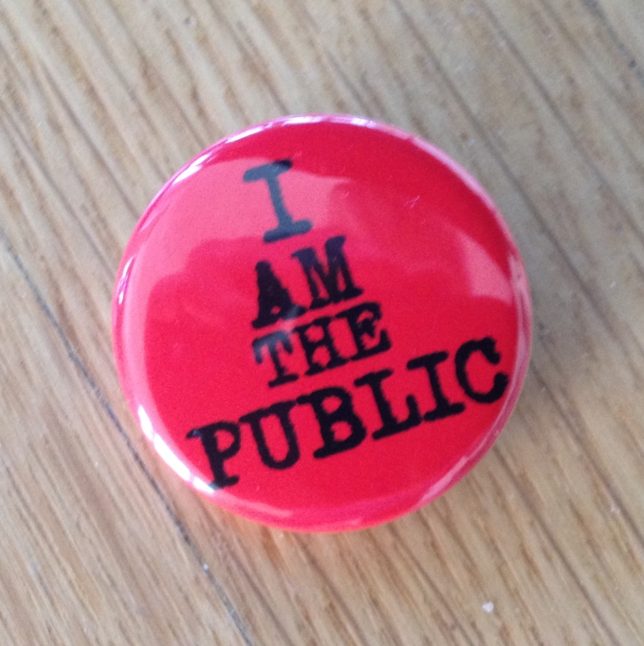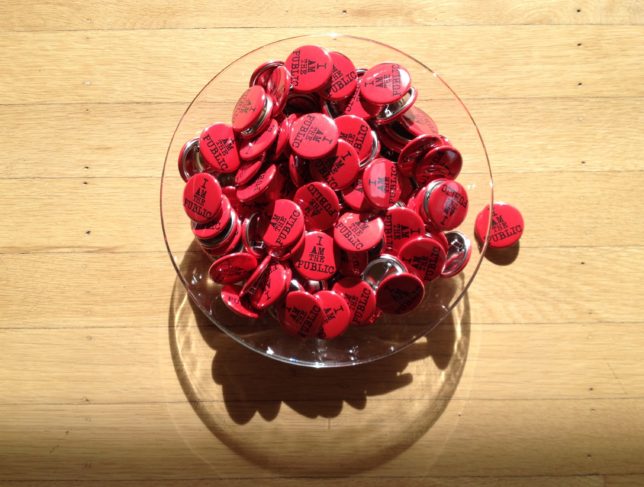“Wait a minute!” I said. “I am the public!” I pointed to people in the room and said, “You are the public, and you are the public!”
In an interview earlier this year, David Mendoza recalled making this comment. He was referring to a moment in the late 1980s when he was in the midst of a debate about public funding for the arts. Three students – Karen Beech, Jessica Capó, and Lizzie Trelawney-Vernon – at the University of Washington School of Art + Art History + Design – conducted the interview as part of an internship with me, Alum in Residence. We were delving into the history and files of Arts Wire, an online network that started at about the same time as the incident in David’s story. The students decided to produce a podcast series including interviews with intriguing people they found in the files. David was definitely on their list. The hour-long interview, with David in Bali and we in an apartment near the university, covered many of David’s experiences.1 The following exchange took place at the end of the interview.

DAVID: I want to put in one last pitch for public funding for the arts. Anne, do you remember my pin, “I AM THE PUBLIC”?
ANNE: Oh, I still have a couple, David. I should start wearing one.
DAVID: I created that pin because I got so tired of people using the word “public” and saying, “I’m against public funding for the arts. I’m against public funding for this, or public support shouldn’t go for that.” At some debate I was in, I said, “Wait a minute! I am the public!” I pointed to people in the room and said “You are the public, and you are the public.” The anomalous idea that a public means someone who is not me or not many other people…I just wouldn’t accept that. So I created a pin that said, “I AM THE PUBLIC.” And we distributed it widely. People loved this pin because they got it immediately, because they knew they were not being included when the word “public” was used.
What public funding for the arts did, what the NEA did, what NYSCA and many other arts councils did, was diversify the arts in America. They realized that not just a few major European-based institutions were the arts in America: there were all kinds of others. Just last night I was listening to PBS NewsHour and learned there’s a revival of Zoot Suit, Luis Valdéz’s play that he created with Teatro Campesino in California, which went on to Broadway and a movie. Now it’s being revived again. And once again, it has relevance, to the Chicano community especially. Teatro Campesino was supported by both the California Arts Council and the NEA. That theater would never have been supported by a Koch/Trump type of philanthropy, though I don’t actually want to include Trump because he’s really not a philanthropist. But people who were known for their philanthropy gave big money to what they liked. Nothing wrong with that, but there was nobody to give money to Teatro Campesino. That’s what public support for the arts did. And, that’s why we created that pin, “I AM THE PUBLIC.” Everyone who wore it was part of the public.
JESSICA: I just want to chime in…Anne has one of these pins in the office. And when she told me the story about it, it really spoke to me and I tend to tell a lot of people about it. Personally, I am myself Hispanic and a lot of my co-workers are minorities as well, you know, Pakistani, Taiwanese. I mentioned this same pin to them, actually just today. I mentioned it to them in the art context but also in terms of what’s happening today. And they loved it, and they were just, like… YES, this is exactly it.
DAVID: Yes! Maybe your first activism after this podcast could be, just make some! Just make it!
VOICES ON TOP OF EACH OTHER: Just make some! Yeah! And… create some. Definitely!
DAVID: I’m telling you, it was amazing. Actually the message is quite, I don’t want to say deep, but profound in a way…patting myself on the back a little, I guess. But I remember, for example, a Gay Pride March [in Seattle], which used to be on Broadway in those days. We were marching and had bags of them and were handing them out. People loved this pin! They got its message immediately. Then I’d see it on people all over Seattle. I think it’s a very good thing to revive! They’re not expensive…just reproduce it.
JESSICA: It’s so funny, I was just thinking about this today. After mentioning them to my co-workers, it was, wow! I just want to make more and start giving them to people. Yeah… it’s just amazing. It doesn’t have to be in the art context, but just in general…what that actually means to people. Just making them realize they are part of this whole debate. They are the public. “Yeah! I am, and I really should have a bigger say in what’s going on.”
KAREN: It’s a reaffirmation of your own value. This understanding that, like, wait a second, I’m culpable. I’m responsible. And that means that I also have power and I have agency. That is really important! We so often become isolated in the sense that we think, well, my opinion is this. But the point is not that. The point is that my opinion is as valid as the “public’s” opinion, that everybody has an individual opinion, and that, all together, is what creates any group, right? even on the scale of the country.
DAVID: And remember, you have to always be aware that when you hear someone talk about the “public,” they probably have an idea of it that doesn’t include a lot of people. They’re excluding part of the public.
ANNE: When you come back in June or July, David, we’ll give you a new pin.
JESSICA: Yeah, we need to revive this!
DAVID: Yes! I have one in my little treasured storage chest in Seattle. It’s time, it’s time again. We’ve come full circle with what’s happening right now.
KAREN: If you had the opportunity to share some advice or to provide some guidance to people who are wanting to be involved now and wanting to be active now, in the current moment, what might you say?
DAVID: I was so devastated after the election that when I left the U.S. last December, people here would ask, “What’s wrong with you?” I really had thought, with the election of Obama, that all the work we’d done had slowly progressed, one step forward, one step back, and onward. I thought we finally had arrived where we’d been trying to get all these years, though of course, there was still a long way to go. And then this sudden turn… I just felt like it had been a waste in a way.
But I’ll tell you what heartens me right now, where I find solace and hope is seeing all these people who are turning up at the town hall meetings of Congresspeople around, in Nebraska and Kansas, that I’ve been reading about, and in Texas. Republicans in Congress are having meetings with 800, 1000, 1500 people showing up who are well-informed, who are angry, who are speaking out. My god, we never had anything like that in those days. We would only have dreamed we could have orchestrated something like that. What’s truly important now is showing up first and secondly opening your mouth. That would be the advice I’d have. Show up, open your mouth, and be informed.
“That would be the advice I’d have.
Show up, open your mouth, and be informed.”

AFTERWORD: At one of our weekly meetings a month or so after the podcast recording, the group of interns surprised me with several hundred brand-new pins. You can bet that one way or another, they’ll make sure David gets some of the new ones.

• • • • •
NOTE
1 Jessica Capó created a website for posting the series of podcasts produced by the interns from their work with Arts Wire files. There will be about 15 episodes in the final series. They’re posted weekly on Fridays. The site is here., and the interview with David is titled, “Golden Horseshoe.” You’ll find a list of all the podcasts with live links to the audio at the “podcast” tab, and a brief description and additional notes at “extras.”
The podcast production is definitely low-tech, just the make-it-up-ourselves style I love. We gather at Jess’s apartment a few blocks from campus (my office reverberates too much) around a dining table with a small microphone and a cell phone on the speakerphone setting. You might need to adjust your ears a bit.
Final note: You can also read a memoir David wrote about his life since graduating from the UW, here.
![]()